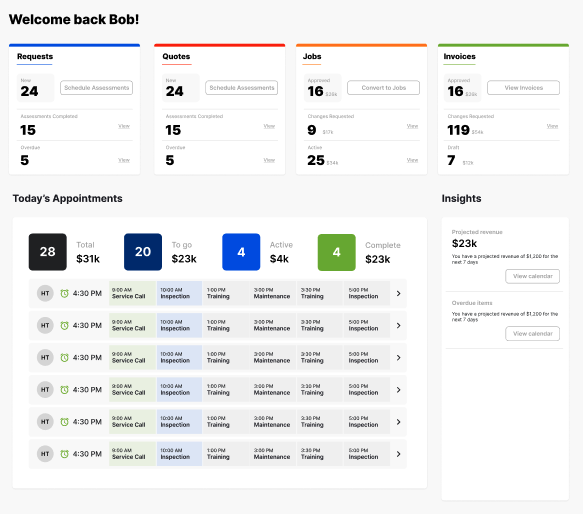Top 5 Features Every Field Service Management Software Must Have
For businesses like cleaners, technicians, and maintenance companies, delivering timely and efficient services is crucial for growth. Having the right software to support field representatives throughout the entire service delivery lifecycle is essential. Company leaders must ensure their organization's field service management software includes several key features to meet these demands.
Duration:
Published on February 28, 2024
What is Field Service Management Software?
Field service management (FSM) software is a crucial tool for businesses seeking to streamline the management of their field-based workforce. By optimizing the positioning, availability, and skills of labor resources, FSM software enhances operational efficiency and customer satisfaction. Ideal for companies offering on-site services such as equipment maintenance, cleaning, repairs, moving, and delivery, FSM solutions cater to diverse industries requiring technical expertise.
From managing cleaning methodologies to providing computer hardware support or maintaining critical infrastructure like a city's electrical grid, FSM software offers versatile functionalities to meet various service demands. Managers and supervisors leverage FSM platforms to streamline scheduling, assignment, route planning, and resource allocation for on-site field workers. Additionally, these tools facilitate the dissemination of work instructions and enable real-time updates on productivity, task completion, and arrival and departure times. Field employees carry FSM software, ensuring seamless communication and immediate technical support for any unforeseen challenges encountered during assignments.
Top 5 FSM Software Features
Scheduling and management is a critical component of field service management software, enabling dispatchers to efficiently arrange appointments for customers. With FSM software, dispatchers can easily set up appointments, ensuring seamless coordination.
Key features like text notifications, rescheduling options, and real-time tracking of changes or feedback from field representatives or customers are essential. These functionalities contribute to timely service delivery and customer satisfaction by facilitating effective communication and adaptability within the service team.
Mobile accessibility is a valuable feature of FSM software, empowering engineers or service representatives to access appointment details anytime, anywhere, without the need to contact their office. This capability significantly saves time and enhances efficiency.
Moreover, mobile access enhances customer service by allowing service representatives to utilize the mobile version of the software to add notes during the job and schedule follow-up appointments if necessary. This proactive approach saves customers time, eliminating the need for them to contact dispatch to schedule appointments independently.
Another essential feature to consider when selecting FSM software is the quote and invoice generator. For some companies, the ability to generate invoices and quotes directly within the software is crucial. This is particularly beneficial for businesses that prefer to bill customers upon completion of work orders, as it enables technicians to receive payment on-site, thereby reducing the workload for accounts receivable.
Additionally, for companies with long-term service contracts, tracking services throughout the year is vital. FSM software can facilitate this by allowing for the monitoring of contract profitability based on product or service agreement types. This capability provides valuable insights for organizations, enabling them to optimize contract management and maximize profitability.
The CRM feature empowers technicians to document not only the current state of a customer's product but also anticipate and address future needs effectively.
Beyond recording product statuses, technicians can input crucial details such as the most effective communication channels for individual customers, ideal times for outreach, and comprehensive purchasing histories. This holistic approach enhances customer interactions, fosters better communication, and enables personalized service delivery. Ultimately, it elevates the overall customer experience while optimizing service efficiency.
Analytics and reporting are pivotal features within FSM (Field Service Management) software, offering significant value for both operational efficiency and managerial insights.
Through a robust reporting component, companies can gain valuable insights into various aspects of their operations. This includes metrics such as technicians' productivity, derived from analyzing their booked appointments and invoice generated. Furthermore, data on appointments categorized by product type, and the average duration of service, provides actionable information for optimizing workflows and resource allocation.
Moreover, depending on specific requirements, companies may also benefit from additional features within FSM software. These could include functionalities like GPS tracking for company vehicles, enabling real-time monitoring and optimization of field operations. Additionally, comprehensive project management tools can streamline tasks, enhance collaboration, and ensure project timelines are met effectively.
Why Is Field Service Management Software Important?
Field service management software helps companies manage all the resources that go into field service operations and processes. Since field technicians must complete various tasks, field service management software can help them visualize daily goals and assist them with project and contract management.
Field service management software offers substantial benefits for businesses managing field workers:
- Streamlined coordination and monitoring of employee schedules, customer appointments, and timelines.
- Time and cost savings through appointment optimization features, reducing travel time and fuel expenses.
- Automation of dispatch, scheduling, and invoicing processes, minimizing errors and increasing efficiency.
- Proactive inventory monitoring to ensure timely replenishment and reduce stockouts.
- Enhanced communication and transparency among field workers, management, and customers.
- Improved operational efficiency and employee productivity through automation and streamlined processes.
- Enhanced visibility with tools for collecting, tracking, and analyzing crucial data such as job completion times, expenses, and field notes.
- Empowerment of field technicians with more time for customer interactions by eliminating manual administrative tasks, providing easy access to resources, facilitating communication, and centralizing schedules and updates.
While field service management software provides significant benefits, it's important to consider Flowcarve for optimizing customer journeys and scheduling processes. Each solution addresses different needs and should be carefully evaluated based on the organization's requirements.
